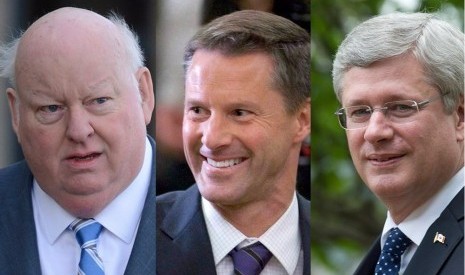The Duffy Affair: Harper contradicts himself… again
As Canadians look for answers in the ongoing senate saga, Harper’s statements and lack of statements have raised more questions than answers. One minute, the scandal is isolated to his former chief of staff Nigel Wright, the next, “very few people” knew. One minute, he was saddened to see Wright resign, now Wright was “dismissed.” In 2005, the Prime Minister was responsible for the actions of his staff, today, there is no correlation. In 2005, withholding information was enough reason to hold a political leader to the fire, today, it is the norm. It appears contradictions are dominating Harper’s dialogue and actions, should he be held by his 2005 standards today?
The Duffy Affair is the nightmare Harper created and fuelled with his handling. As a result, the Prime Minister who won on the basis of accountability ended up with dirty hands and to his inconvenience, Canadians can easily be reminded of where he once stood.
Contradiction 1: Wright resigned with “great regret” or was “dismissed”?
In an interview Monday with Jordi Morgan from Halifax’s News 95.7, Harper said he “dismissed” his former chief of staff. “I think the responsibility whenever things go wrong is for us to take appropriate action. As you know, I had a chief of staff who made an inappropriate payment to Mr. Duffy, and he was dismissed,” Harper said.
However, on May 19, Wright officially resigned and Harper accepted his resignation with “great regret.”
“It is with great regret that I have accepted the resignation of Nigel Wright as my Chief of Staff. I accept that Nigel believed he was acting in the public interest, but I understand the decision he has taken to resign. I want to thank Nigel for his tremendous contribution to our government over the past 2½ years,” Harper said.
Contradiction 2: Wright acted alone or with others?
On July 6, Harper told reporters Wright acted alone, even though the RCMP and Wright’s lawyers indicated otherwise.
“I think if you read the affidavit it makes very clear that the decision to pay money to Mr. Duffy out of Mr. Wright’s personal funds was made solely by Mr. Wright and was his responsibility,” Harper told the news conference.
“Obviously, had I known about this earlier I would never have allowed this to take place. When I answered questions about this in the House of Commons I answered questions to the best of my knowledge.”
However, on October 24, Harper responded to opposition leader Thomas Mulcair claiming he informed “very few people.”
“Mr. Wright made this decision. He has been very clear. He informed very few people. It was his own decision and his own initiative,” Harper said.
“Any insinuation or any suggestion that I knew or would have known is incorrect. As soon as I knew, I made this information available to the public and took the appropriate action.”
Contradiction 3: Did Harper approach Duffy after the caucus meeting or not?
On February 13, when Canadians wanted to know if Harper knew about the $90,000 deal, Harper said he learned about it the same time we did. In addition, his office stated he didn’t mention any senator by name in the caucus meeting.
“The Prime Minister did not mention Duffy or any other senator by name,” the PMO statement said.
However, on October 24, when grilled by Mulcair with the very statement, Harper said the contrary.
“In response, I was extremely clear. I said, ‘You cannot claim expenses you did not incur,’” Harper said. “That message was also delivered personally to Mr. Duffy at the end of the meeting.”
Contradiction 4: Is Harper innocent, or does he have something to hide?
The prior contradictions demonstrate simple questions Harper has reluctantly answered and contradicted himself on. It is also worth noting Harper refused to answer questions the day he opened up his caucus meeting to the media, and in a timely fashion, his caucus members made enough noise to block out journalists who wanted to ask questions.
In 2005, when Harper sat in the opposition benches to Paul Martin’s Liberal government, he classified this behaviour as a reason to assume guilt.
“My difficulty with the prime minister at this point, Peter, is that I don’t think that he’s been forthcoming and honest on fairly simple questions when there appear to be contradictions,” Harper says. “My instinct is when somebody doesn’t answer questions, even simple and fairly innocuous questions in a straightforward manner, there may be something else.”
Contradiction 5: To be forthright or not to be?
Harper has been silent and has deflected the media by limiting questions and attempting to change the channel on the Duffy affair. Consequently, he has hid behind his staff.
In 2005, Harper argued the proper strategy was to take “every opportunity to be as forthright as possible.”
“When you’re under the kind of cloud, the prime minister admits the government is under, I think he would use every opportunity to be as forthright as possible.”
Contradiction 6: To be accountable or to decide to become accountable?
Harper pitched a strong campaign on the basis of accountability. Actions speak louder than words. However, given Harper’s dialogue in the opposition benches, is it time he be held to his standards?
“When does the government decide it’s time to become accountable? After 10 years? After they’ve proven just how reckless they can be with our money? Maybe it’s when Canadians for good reason begin to question their accountability. I believe that when a government needs to decide to become accountable, it’s time to demand a higher standard of government. It’s time to demand better.”
Stephen Harper has contradicted himself a number of times both in terms of the story, and in terms of his prior principles. What do you think of his contradictory pattern?





